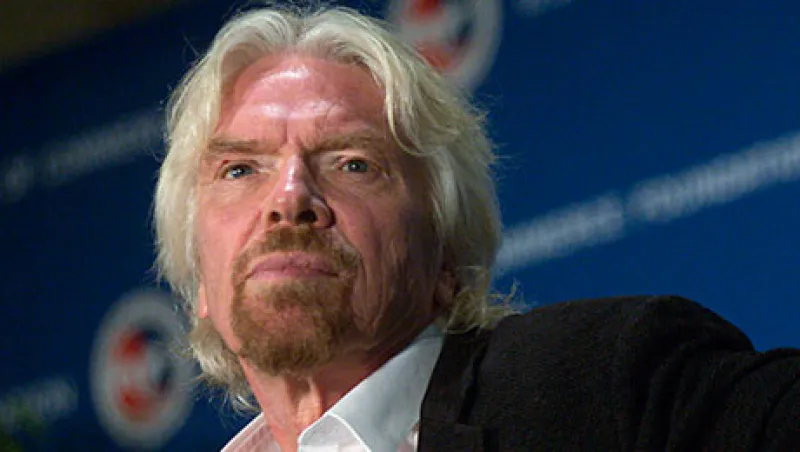Try brainstorming word associations with the color red, and “cool” is not likely to come up. And for a bank, being in the red is decidedly uncool. Yet when it comes to Virgin Money Personal Financial Service, the company founded by perennial entrepreneur Sir Richard Branson, the signature scarlet hue of parent Virgin Group aims to connote both hipness and financial stability.
In a week or so, the upstart financial institution is going to take its next step to make inroads into the U.K.’s firmly entrenched inner circle of banking. According to an unnamed source close to the deal, Virgin Money is holding a £150 million ($238 million) initial public offering toward ”the back end of next week.”
Analysts have estimated that Virgin Money could be valued at between £1.5 billion and £2 billion at the time of the listing. The company has said that it expects to become eligible for inclusion in the FTSE U.K. indexes and that it plans to pay out a dividend target of 10 to 20 percent of statutory profit after taxes. “If their price is in the expected range, they’re going to be priced a little more expensively than some of the incumbent banks,” says Jared Woodard, equity derivatives strategist at BGC Partners in New York. “The expectation is that Virgin Money is going to be faster growing and be exposed to [attractive] retail banking margins.”
From an image standpoint, Virgin Money’s share issue looks likely to boost its ongoing efforts to scale up its strategy of targeting younger people to grab market share from the U.K.’s major banks. Virgin Money has made its way onto the roster of CoolBrands, a ranking of companies selected by members of the U.K. public and the Expert Council, a panel of 37 British scenesters. A Virgin Money branch, complete with easy chairs, free Wi-Fi and complimentary beverages, feels more like a boutique hotel lounge in London’s trendy Shoreditch neighborhood than a traditional bank outlet. But it will take more than a cool brand for the challenger bank to make significant inroads against the U.K.’s entrenched financial institutions. The company will have to continue its lean operations and tight focus on targeting young people to switch their accounts and business to Virgin Money.
“In the U.K. the current account market is notoriously inertia-prone,” says Daoud Fakhri, senior analyst at Datamonitor Financial in London. “Consumers just do not like to switch” — not even younger people.
For years Virgin Money CEO Jayne-Anne Gadhia has promised that Virgin Money would offer personal current accounts, the U.K. equivalent of a checking account. She delivered in part on the promise in July, when Virgin Money launched in Scotland and Northern Ireland a very basic current account with no overdraft protection and no fee. According to the bank, personal current accounts will be rolled out gradually elsewhere in the U.K. It’s critical for a bank to offer current accounts because they are the gateway to so many other customer relationships. Getting people to switch banks is no easy task.
The U.K.’s four biggest banking incumbents — Lloyds Banking Group, Royal Bank of Scotland, Barclays and HSBC Holdings — account for 77 percent of the nation’s personal current accounts, according to the Competition and Markets Authority, the U.K.’s new competition and consumer watchdog. The Big Four also control 80 percent of the 3.5 million business current accounts in England, Scotland and Wales, and 90 percent of those in Northern Ireland, according to the CMA. . In the U.K. current accounts are typically offered free of charge as long as customers keep their account ledgers in the black, with no overdrafts.
Virgin Money’s road to its IPO has not been without bumps. Citing the recent woes of European markets as the reason, on October 17 the bank postponed its IPO, which was originally scheduled to take place that month. Fellow U.K. challenger bank Aldermore, which operates online, also postponed its share offering from October, and Pershing Square Holdings, the publicly traded permanent capital vehicle of William Ackman’s hedge fund firm, Pershing Square Capital Management, has had lackluster performance since its IPO on the Euronext Amsterdam exchange on October 13.
The IPO is limited to U.K. institutional investors and is specifically barred from distribution in Australia, Canada, Japan, South Africa or the U.S. The shares are, however, available to qualified U.S. institutional buyers that rely on the safe harbor from registration requirements in Rule 144A of the Securities Act of 1933. “We’re allowed [qualified institutional buyers], and that is all,” says Adam Key, director of investor relations at Virgin Money. “It’s really strict.”
Virgin Money’s current investors stand to profit handsomely from an IPO. U.S. billionaire Wilbur Ross Jr. invested £96.5 million in Virgin Money in 2010, when he acquired a 21 percent stake in the firm. Ross increased that stake when he invested an additional £260 million in Virgin Money’s acquisition of Northern Rock in 2012. According to the IPO notice, Branson and Ross are selling some of their shares. Branson owns 47 percent of the company, and Ross owns 44 percent. Abu Dhabi–based Stanhope Investments is also an investor.
When it lists, Virgin Money will make its £50 million final payment to the Treasury for its purchase of the retail banking side of Northern Rock. The Newcastle–based bank failed and was nationalized in February 2008. Two years later it was split into two parts: asset management and retail banking. In November 2011 the U.K. government announced that Virgin Money would buy Northern Rock’s banking business for £747 million in cash and additional payments of as much as £280 million.
The £50 million from the IPO will complete all payments owed to the government for the acquisition and bring Virgin Money’s total payments to £1.02 billion. This still falls short of the £1.04 billion the government paid to keep Northern Rock running, however. But “for Virgin Money it’s a definite positive for the IPO to put the Northern Rock issue to bed,” says BGC’s Woodard.
Besides the opportunity to move beyond Northern Rock once and for all, another part of Virgin Money’s appeal, Woodard says, comes from the financial institution’s C-suite. CEO Gadhia “has proven some real skill at the level of operations,” he says. “She’s mentioned all the right things on a forward-looking basis” and has made a commitment to a strong dividend and to continue the growth plans already in place. With the IPO, Gadhia will become the first woman to head a publicly listed bank in the U.K. Comfy lounges with Wi-Fi notwithstanding, that’s very cool.
Get more on banking and on corporations.






